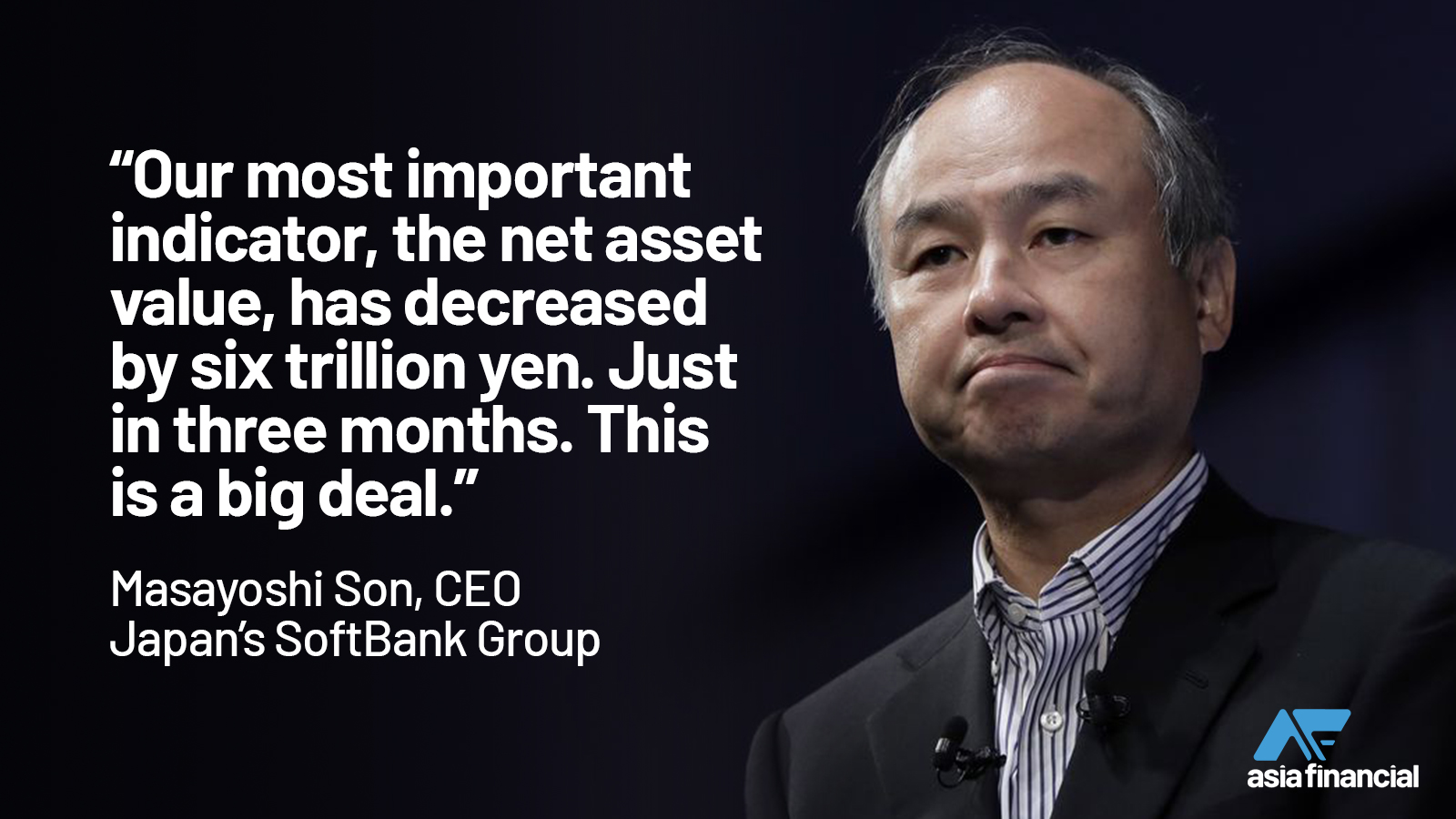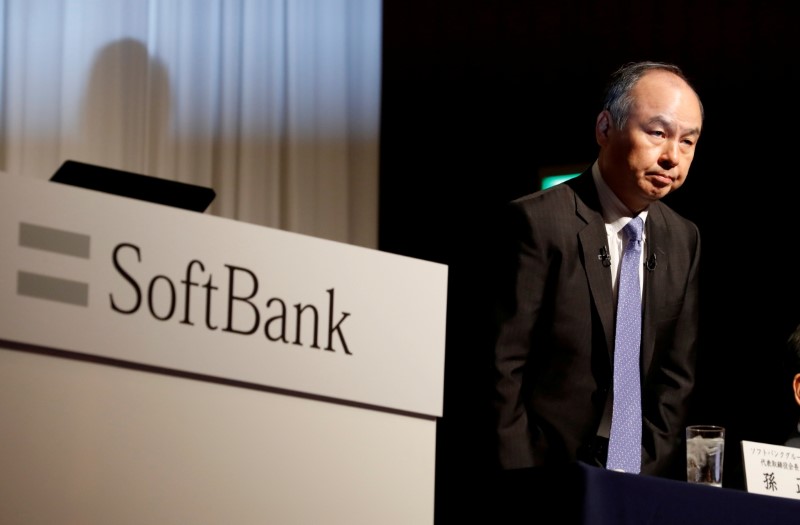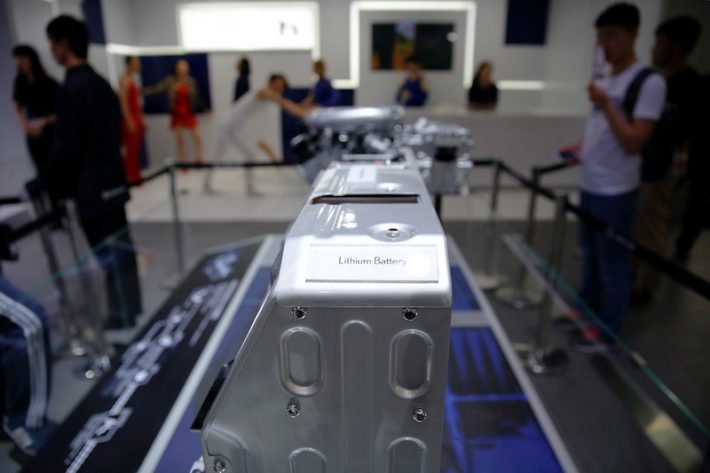Japan’s SoftBank Group on Monday suffered its first quarterly net loss in 18 months owing to a plunge in its Vision Fund investments, including embattled Chinese e-commerce giant Alibaba and ride-hailing firm Didi Chuxing.
The telecoms-firm-turned-investment giant posted a net loss of 397.9 billion yen ($3.5 billion) in July-September, the first since January-March 2020, dragging first-half net profit down more than 80% on-year.
SoftBank Group has poured money into some of the tech world’s biggest names and hottest new ventures, from AI to biotech, through its $100-billion Vision Fund.
But those investments have proved tumultuous, partly because of the dramatic regulatory crackdown in China endured by companies in the tech sector this year. Indeed, CEO Masayoshi Son said on Monday the firm was “in the middle of a blizzard.”
In total, SoftBank said its loss on investments during the quarter amounted to 1.66 trillion yen, including those incurred by its Vision Fund operations.

‘It Was Alibaba, Didi..’
“We’re not proud of that,” Son said of the first-half results. “Our most important indicator, the net asset value, has decreased by six trillion yen. Just in three months. This is a big deal.”
Son said the results could be boiled down to one key factor: “In one word, Alibaba,” he said.
Shares in Alibaba Group Holding, SoftBank’s largest single investment, fell more than 30% in the three months ended September, as authorities in China embarked on a crackdown on tech firms as part of a drive to tighten their grip on the economy.
The firm also took a hit from DiDi Global, parent of Didi Chuxing, which has also been in Beijing’s crosshairs.
DiDi’s share price “is dropping under the influence of the Chinese government’s regulations. Most of the other Chinese shares we own are also tumbling,” Son said.
After the April-June first quarter, Son said he would be taking a careful approach to investments in China, acknowledging “tough challenges.”
“We want to be cautious,” he said in August. “New regulations, new rules are being implemented, so until it gets settled we want to wait and see. In one year or two, it will be clearer.”
Unpredictable Earnings
In total, the firm said its loss on investments during the quarter amounted to 1.66 trillion yen, including a loss of 321 billion yen for Didi, and 1.21 trillion yen from its stake in South Korean e-commerce firm Coupang.
SoftBank’s investments in volatile tech firms and start-ups have made for unpredictable earnings.
In 2019-20, it reported a record net loss of 961.6 billion yen as the start of the pandemic compounded woes caused by its investment in troubled office-sharing start-up WeWork.
But it then reported Japan’s biggest ever annual net profit in 2020-21, driven by tech-share rallies as people moved their lives online during the coronavirus pandemic.
Writing last month, Kirk Boodry, an analyst at Redex Research, warned of a “tough” earnings report for SoftBank.
“China exposure is a major driver whilst Coupang continues to spiral down from the heady highs in March,” he said. “The strategy of let’s create the perception of enhanced value by taking things public hasn’t really worked this year.”
Share Buyback
As usual, SoftBank did not issue an annual forecast, with its business model increasingly dependent on often volatile stock market activity.
SoftBank’s quarterly net loss compared with a profit of 628 billion yen in the same period a year earlier.
Later on Monday, SoftBank said it would buy back up to one trillion yen ($8.82 billion) of its own shares, or 14.6% of outstanding stock.
The company has been trimming stakes following the expiry of lock-up periods, while focusing on investing through its second Vision Fund that has $40 billion in committed capital from SoftBank itself.
Bright spots for the Vision Fund include its India portfolio with ride-hailer Ola and logistics firm Delhivery targeting listings.
SoftBank shares, which have lost around a quarter this year, closed down 0.77% at 6,161 yen ahead of earnings today – before the share buyback plan was announced. The Japanese conglomerate completed a record 2.5 trillion yen buyback in May.
• AFP with additional editing by Jim Pollard
ALSO SEE:
SoftBank Scores With $680m Funding Round For NFT Soccer Game Sorare
SoftBank Expects Bumper Gains from Indian Tech Startups: BS
























